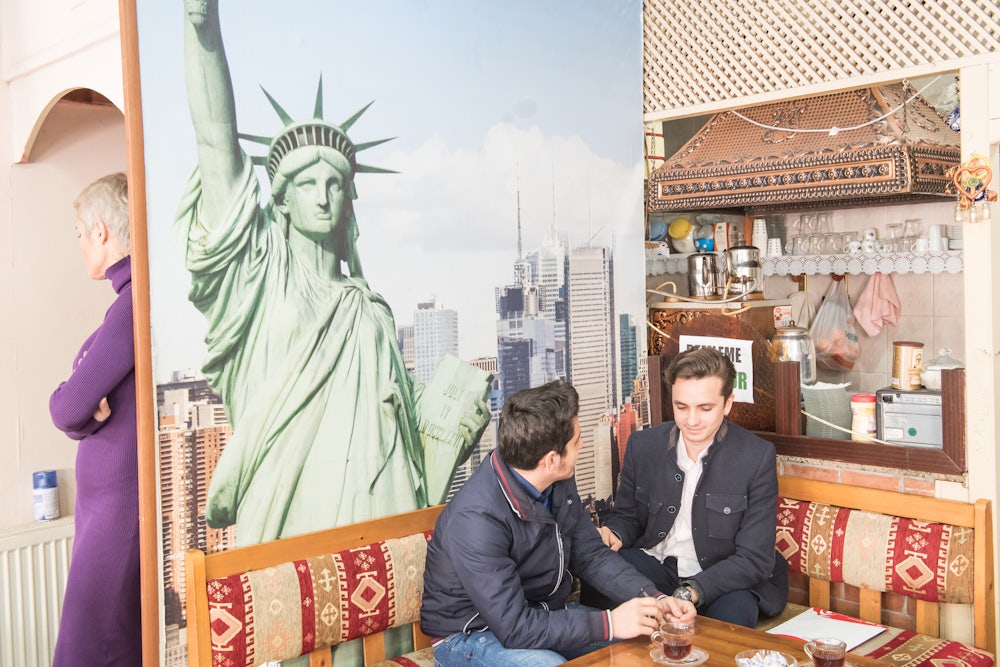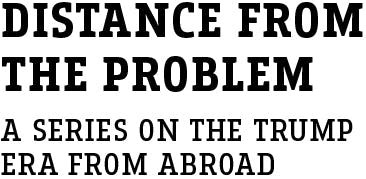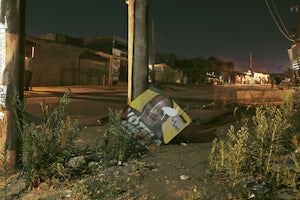The Pan-American Exposition took place in Buffalo, New York, in 1901, the dawn of the American Century. It was a celebration of the country’s colonial past and present, as well as its imperial future. Inside a fairground booth called “Old Plantation,” African Americans played slaves picking cotton. Another exhibit was about how Native Americans killed stray dogs and ate them. When President William McKinley arrived at the Temple of Music, an emcee addressed him as the “Chief of our Nation and Our Empire.” In his speech, McKinley denounced isolationism and endorsed free trade, and afterward, he gamely shook hands with members of the audience. That was when Leon Czolgosz, an unemployed wire factory worker and anarchist, inspired by a lecture he had attended by the radical Emma Goldman, pulled out a .32-caliber Iver Johnson revolver and shot the president twice. James Parker, a black waiter, heroically tackled Czolgosz. McKinley died from his wounds eight days later, becoming the third president assassinated in a 50-year period. Czolgosz later offered his reasons for the shooting: “McKinley was going around the country shouting about prosperity when there was no prosperity for the poor man.”
Many thousands of miles away, in Constantinople, now Istanbul, where I live, the president of a boys’ school recalled, in a 1909 book, how he had worried that the barbarous shooting would blight the image of the United States for his students:
These great crimes have confirmed the belief of Europeans in the picture of American society, which they get from their newspapers, which represents us as worshipers of the almighty dollar, given over to lawlessness and regardless of human life, with little real respect for God or man.
The president, George Washburn, cared so much about what happened in the United States because his school, Robert College, was an American school. Founded in the mid-nineteenth century by an American missionary, with funding from a wealthy New York merchant—other schools with similar missionary backgrounds included the Syrian Protestant College of Beirut and the International College in Izmir, Turkey—Robert College was a byproduct of a century of Protestant efforts to convert the Muslims of the Ottoman Empire to Christianity. That project failed miserably, so the American zealots gave up their dreams of conversion in the Levant and instead built secular schools that propagated a distinctly Protestant and American worldview that, at the same time, wouldn’t arouse the ire of the Ottoman authorities. They needn’t have worried too much. The figures who most took issue at first with the establishment of the schools were not the Sultan and his government, the Sublime Porte, but the French and the Russians, who viewed these institutions as the first outposts of a nascent empire.
The French and the Russians were right, of course. McKinley had launched America’s empire three years before his assassination, in 1898, when he entered the Spanish-American War and occupied Cuba and the Philippines. Washburn, an American who lived in Constantinople for 50 years and knew well the complexities of foreign intervention, was skeptical of his birth country’s burgeoning superpower status; he believed the U.S. Congress was “ignorant of foreign politics.” But even Washburn rejoiced when the United States won the war, writing that he hoped America would be “endowed with wisdom” to manage “our new possessions.” The fate of these missionary schools abroad—both the American and Turkish teachers and their Turkish students—would be forever to occupy a dual existence, one that regarded U.S. foreign policy critically, even contemptuously, but remained firmly in the orbit of, not purebred American exceptionalism, but a kind of American-centrism. For more than the next century, some of the boys—and eventually girls—who attended Robert College would aspire to attend college in the United States, to speak American English, and to engage with American liberalism. But what would happen when that American project of liberalism was seemingly upended, not by presidential assassination or gun violence, but by the arrival of a figure like Donald Trump?
The 2016 presidential election transformed the way many Americans see themselves. Liberals discovered how much they believed in their country’s exceptionalism—the idea that the national experiment of immigration, democracy, and individualism would produce a country uniquely poised to lead the world—and how devastated they were to learn that it might never have been real. After the election, one could hear howls all over the country: This man does not represent us; this is not who we are. More often than not, American liberals have insisted on seeing Donald Trump as an aberration, an insult—a disease that will be eradicated after its cure is discovered.
From abroad, things look different. For 100 years, every man and woman on earth who happens not to be living in the United States has had to incorporate its cultural, political, martial, and economic influence into their understanding of the world and their identities in it. In places like Turkey, at the height of the Cold War, this education not only involved an exposure to violence and manipulation, but a negotiation between one’s native culture and those of the United States and the Soviet Union. How should a person be? Am I a capitalist, am I a socialist, am I something else entirely?
One of the few American novelists to chronicle the American empire abroad—Don DeLillo, Robert Stone, and Ward Just are others—is Maureen Freely. Set in the Cold War of the 1960s, ’70s, and ’80s, her novels The Life of the Party, Sailing Through Byzantium, and Enlightenment, take place in spy-ridden Istanbul, and specifically at Robert College, where Freely’s father, John, was a teacher. Freely’s novels are an important record of the American presence here: The poster blaring “Imperialist Americans Go To Hell”; the Turk who “did not like the way his country, once great, had become the pawn of the superpowers”; and the Turk worrying about how he could “continue to work at an American institution if he were to make public his anti-American ideas?”
In those years, when travel from impoverished, authoritarian Turkey to the West was less common, these contradictions might have weighed heavily on the few Robert College students who did get to go to the United States for college. As Freely writes:
As Turks suspended halfway between East and West, they would have to betray many of their parents’ beliefs.... They would feel the same shame when they became too Americanized, and the same isolation. When they went abroad to complete their studies, they would spend just as much time as he had searching for an Armenian delicatessen where they could buy stuffed vine leaves and white goat’s cheese. And, having trained themselves adequately, they would encounter the same frustrations when older, narrower minds stood in the way of progress. Was it worth it?
Young Turks today live in a more diffuse, globalized culture, one that comes with a heavy exposure to Europe as well as the United States. But when Americans ask that perennial question of foreigners—What do you think of us?—it is rarely with the acknowledgment that being forced to choose between one’s own culture and the influence of the United States is a painful, exhausting, and unwinnable endeavor.
I have often watched an American visitor to Istanbul awkwardly ask a Turk if they knew some aspect of American culture—“Oh, I’m sorry, do you know what The West Wing is?”—only to see the Turk’s eyes roll into the back of their head. Well-educated Turks, who likely have been to the United States or even lived there, seem less surprised than Americans that the country would elect a belligerent, racist, nationalist white man who is ignorant of foreign affairs and even simple geography.
I wanted to understand how Turks who would ostensibly have some affection for aspects of the American project had come to feel about it after Trump’s victory, so I turned to the ones educated at an institution that had perhaps the longest and deepest history and experience with the United States: Robert College. Some of the people I spoke to there had graduated as recently as 2016 or 2017, and others as long ago as the mid-1990s; some went to elite colleges in the United States (Yale, Brown, Princeton) or the U.K., and some stayed in Turkey. Some are rich, others are not. Some of these are the Turks about whom Americans hear on occasion in newspapers: the “secular elite,” the so-called Westernized liberals, the ones that I suspect many Americans like to believe aspire to a Western or American lifestyle or even citizenship. Few of them, because of the current political climate in Turkey, wished to be quoted on the record, but all of them had eager, complex, well-informed, and subtle views on the topic of America. Could these Turks—intimately acquainted with American society and politics, yet possessed of the clear-eyed discernment of the outsider—tell me what the election of Donald Trump says about who Americans really are?
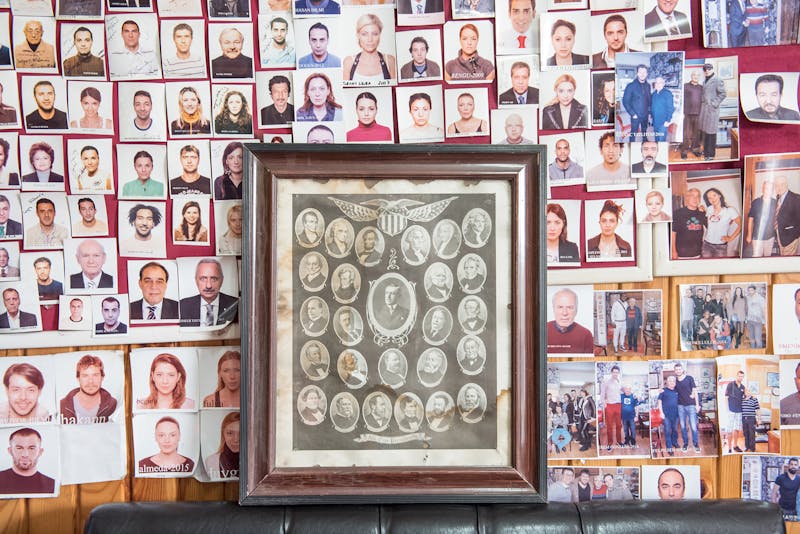
The Robert College campus is a collection of stately gray stone buildings sitting atop a thickly wooded and steep hill overlooking the Bosphorus. To walk up the hill from the sea road is to lose your breath, and also your bearings. The deforestation and overdevelopment of Istanbul make the campus—verdant pine trees, Ottoman Empire–era buildings, wooden houses, hushed quiet—a gorgeous memory of the past, where the luxuriousness is not only a material matter but an environmental one. The campus feels happy, and the students look happy. If the kids at the German school in Istanbul are reputed to be moody and poetic, and the kids at the French school are rumored to be demoralized by strict teachers, then the Robert College kids seemed confident, outgoing, and open. Since it is known as the best school, they are also sometimes regarded by their peers as snobs.
One woman I met not far from campus, a corporate lawyer who graduated from Robert College almost twenty years ago, had lived in the States for only a year, but she knew American politics, especially, she joked, because she, too, was a fan of The West Wing. (Most of the graduates I spoke to were living abroad. I only met a few of them in Istanbul.) We had lunch one day at a restaurant called Mangerie in a neighborhood called Bebek, or Baby. Mangerie overlooks the Bosphorus, and many customers sit outside on the balcony to smoke and glimpse the sea. These Turks are tanned and drink wine at lunch. We ate sea bass sandwiches with some sort of olive and parsley paste.
Like many of the Turks I spoke to, she was surprised that Trump won, but not shocked, and this distinction seems important. “To be honest, it was the Republican primaries that surprised me,” she said. “But what exactly was so shocking?” People like her knew enough about American politics to realize that Trump did not fit into the Republican establishment, and so it was unclear whose interests he was serving.
But his character and temperament also seemed in line with certain aspects of the United States that they had observed. “America is a capitalistic country, and it’s all about money and opportunity and be anything you want,” another graduate said. “So isn’t Trump also a symbol of the American dream?”
These Turks tend to hold two ideas of America in their heads. The first one is a place of heightened personal freedom and the best universities in the global marketplace; the second is a government executing a destructive foreign policy. But even the more positive images of America’s domestic lifestyle and human rights are tempered by a kind of realism that I can only categorize as being not-American. These Turks not only do not hold America up on a pedestal, I doubt they hold any country up on a pedestal. They wouldn’t see America as “good” or “evil,” the way some Americans see, say, China or Russia, because they don’t see countries that way. As one Robert College student who attends Oxford explained, “I don’t think anyone in Turkey has a naïve perception of the United States. Even if people apply to school there, and even if they want to stay there, this does not change the perception of the U.S. in the world.”
None of the students I met characterized Robert College as “American,” but rather as a “special Turkish place,” where the sensitivity to fine distinctions that come with living in a complex region like the Middle East is combined with an idealized version of progressive Western thinking. The Turkish Ministry of National Education oversees the school, but the pedagogical system skews American: Kids often take the SATs and AP exams rather than the Turkish state entrance exam (although of course many do). Although the school is seen as the home of the Istanbul elite, 25 percent of the students go there on scholarship, many of whom come from poorer regions of the country. Most classes are taught in English. Some of the most illustrious foreign teachers have included the novelist Geoffrey Wolff; Playboy columnist Asa Baber; John Freely; and David Leeming, the biographer of James Baldwin. (Baldwin, who spent time in Istanbul on and off, in the 1960s, hung out at the school and lived nearby in a house called the Pasha’s Library.) In recent years, as many as 50 percent of the students go to American universities or other universities abroad, many to the Ivy League, and that number can go up or down according to the state of Turkish politics.
At school they read books like To Kill a Mockingbird and learn about Pearl Harbor and the bombing of Hiroshima, which, one student complained, a teacher taught as something the Americans had to do in order to win the war. But the students also told me there was no other sort of overt propaganda about American foreign policy or America itself. Most Robert College teachers are dissenting leftists, and many of them gave the Turkish kids a less than positive impression of the United States. (Robert College administrators declined to be interviewed for this story.)
Turkish society—perhaps more than most because of its civilization-straddling location and history—cannot be neatly divided into easy ideological categories. There are pro-Erdogan Turks, and there are anti-Erdogan Turks. (Recep Tayyip Erdogan, elected as prime minister in 2003, is currently Turkey’s president, as well as an autocrat.) There are leftists, Marxist leftists, and Kemalist leftists (adherents of a strict secularist ideology espoused by Mustafa Kemal Atatürk, the country’s post–Ottoman Empire founder); communist liberals, secularist liberals, and EU-embracing liberals; old-school nationalists and Islamic nationalists; Islamists and Gulen Islamists; leftist Kurds, liberal Kurds, and Islamist Kurds. Turks can be Alevi or Sunni Muslims; Black Sea, Southeast, Southwest, Western Aegean, or big city; Rum Greek, Jewish, Armenian, Kurdish, Caucasian, Georgian, Arab, Bosnian, Turkmen, Albanian, Circassian, Macedonian, or Bulgarian; feminist, family-first, chauvinist, or misogynist; Besiktas, Galatasaray, or Fenerbahce. I could go on, but you get the idea. Every Turk is different. Except about one thing: I would bet all Turks, all 80 million of them, have, at some point in their lives, felt critical of the United States. That was why I knew that before I could understand how these Turks felt about Trump, I would need to understand how they felt about America.
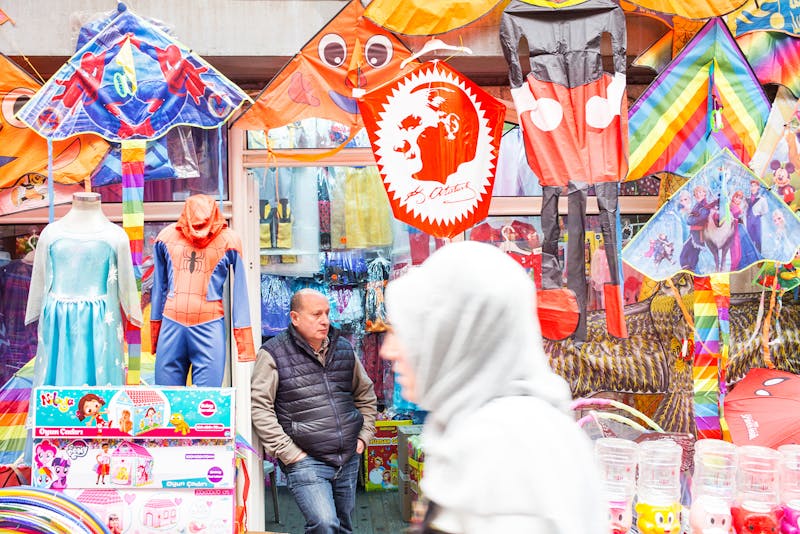
The Robert College Turks seemed to have been amused by the level of outrage and despair among their Clinton-supporting friends in the United States. I experienced a version of this myself after the election, when, after a week of watching me cry, my friends seemed to say, OK, enough. Pull it together. A former Robert College student I contacted, who is living in the U.K., told me about the stories he’d heard from his Turkish friends in the United States. “They were bemused by the fact that students of our age group—and even professors—were so shocked and upset,” he said. “All these people were crying and bawling and saying, You can’t possibly understand what all of this is about!” The Turks found it funny—kind of, but not really—that Americans would say this to them. In fact, it was the Turkish political experience—more than their own knowledge of American society—that seemed to prepare Turks for the possibility that Trump might win.
One graduate I spoke to grew up in a lower-middle-class family near Izmit, a city outside of Istanbul. He had been a scholarship student at Robert College and eventually ended up at Princeton for graduate school. He still lived in New Jersey, and he expected he would stay for a while, but he was vehement about not wanting to raise children in the United States, despite being primed for success in America. “I wasn’t surprised by Trump’s win based on my understanding of Turkish politics,” he said. The idea that “elites assume that their notion of what is reasonable is shared by a reasonable amount of the public” was one he knew well.
He saw a parallel between the American political situation and the Turkish, in which decades of ignoring or repressing marginalized groups in society had empowered populist leaders. “It took people in Turkey a while to understand that wearing the hijab is not a terrible thing,” he said, referring to the strict laws, now repealed, against wearing the headscarf in state institutions in Turkey. “Many of those who thought of themselves as the most Europeanized liberals were against the hijab. This created political capital for Erdogan.” The Turkish students believed the central cause of Trump’s election to be economic. Both the inequality and the racism in the United States had shocked them, but it wasn’t Trump’s election that brought them that news. “I basically tell my family America is just like it is in the movies,” one said. “A society built on racism.”
I met another former scholarship student who graduated from Yale, in an upscale Istanbul mall called Kanyon. (It’s shaped like a canyon.) At lunchtime it is filled with well-to-do Turks who work in corporate towers nearby. It’s a place where you’re likely to see midriffs and men in pink button-downs. This Robert College graduate wore a beautiful blue oxford from Zara. “Compared to Europe and the racism there, I think America is still a much better place,” he said. He paused. “Granted, it’s not Canada,” he said. “No one is Trudeau.”
Trump’s Muslim ban was disturbing, but did not directly impact their lives. The bar for deterring a Turkish student from going to college in the United States was high even before Donald Trump. (On September 11, one graduate said his first thought was, “Oh my God, I hope it wasn’t Muslims, or we’ll never be able to go to college in America.”) Many of the students I spoke to went to Robert College during the George W. Bush presidency, when the invasion of Iraq was wildly unpopular in Turkey. They knew that Islamophobia was emerging in the United States, but neither the gruesomeness of the war, nor the ugliness the terrorist attacks had provoked in America stopped anyone from going to college there.
One reason seems to be that Turks do not typically suffer from anti-Muslim racism in the United States in the same way Arabs or Pakistanis or other Muslims do. Turks occupy a strange place in the American collective imagination. Many Americans don’t know where Turkey is, or whether Turks or Arabs live there. They are not sure if Turks are Muslim; they don’t recognize their last names, and though you will meet a lot of Ahmets and Mehmets in Turkey, rarely do you meet a Mohammad. Most important, many Turks look “white,” and many Turks think of themselves as white. American airports don’t fill Turks with dread.
It occurred to me that Donald Trump’s inexperience and ignorance might not have shocked Turks because they had been exposed to American ignorance, nativism, and narcissism in the Ivy League. The Yale student noticed that Jewish kids there could say they were “culturally Jewish,” but he didn’t think he could pull that off as a Muslim. “What can I say? ‘I am culturally Muslim, but I don’t practice?’ ” he asked me. “Americans don’t understand what that means—Oh, you don’t bomb things?” He thought Americans were self-centered. “They don’t really care about the rest of the world. I don’t see any dedication to becoming a global citizen. Only America matters there.”
I began to feel that these Turkish students had not changed their perceptions of America because of Trump, as many liberals back home might like to assume, but because they had lived in America. There they discovered that even the most educated people were isolated from the rest of the world. “People in the U.S., especially in our age group, have a very different sort of mentality than other people in our age group in Turkey or in Europe,” a student at Oxford said, noting the widely held perception that Americans know little of world history, geography, or politics. “There is a sense that the American young person is very inwardly oriented, in terms of their sense of themselves and their world.” Trump couldn’t make these foreigners lose faith in America, because they had already been disappointed by the American people.
At Robert College the students were exposed to an ethos that celebrates individualism, privacy, ambition, and self-expression. “I wouldn’t say there is any propaganda about America being great,” said a student who ended up at Brown. “But you are exposed to Americans and their ways of thinking. So it depends on how much you’re interested in American literature or American liberalism. Do you buy into that vision, a more Marxist-leftist vision, or a more nationalist-Kemalist vision, or an Islamist one?”
These students are largely the children of Kemalists, leftists, liberals, and nationalists, with a handful of Islamists or Erdogan sympathizers, as well as some Kurds. Some come from famous industrialist families, and some are the middle-to-lower-class children of civil servants. Before Robert College, their exposure to and affinity for American culture varied. Typically, it is the wealthier classes who travel to the United States and Europe and embrace Western values. The lower economic classes have less access to the West and may regard the United States with a kind of cultural condescension. As the student from Izmit explained, these Turks aspired to be European, so they “liked shitting on the Americans the same way the Europeans do. It’s like ‘Look at these upstarts, they have the empire, but they don’t know what to do with it.’ ”
Still, the student body divides between the Amerikaci and the Turkiyeci, or those who long to attend college in the United States and those who do not. Class sometimes determines which path the students favor. “Among the scholarship students, there was an anti-American sentiment,” one student recalled. “It’s about the accent. There was a group of people who would consciously speak English with the Anatolian accent so as not to associate with the United States, but then there were some who spoke with an American accent. They wanted to be bankers, and they knew all their lives that they would live in the United States.”
The decisions these kids were making seemed based on an acceptance or rejection of a kind of global elite status. For some, the acceptance of that status—and the decision to go to an American university; the decision to act like wealthy, Westernized Istanbul Turks—in some way could mean the diminishment of a deeper Turkish identity. But that very same reason—the perception that an American degree can propel someone to global elite status—could also compel other scholarship students to attend an American university.
“Look, I am not from a big-name family here,” the student I met in the canyon mall said. “You can go to the U.S. and if you go to Yale, you can get a good job. In Turkey things require connections.” America is more meritocratic than Turkey—at least for Yalies. Robert College graduates like him thought the reasons for going to college in the United States were obvious. “I mean ... it’s America,” he said and laughed. “It’s America! It’s big, it’s prosperous; it’s free. It has world-class institutions, and it’s meritocratic, and it has the American dream.”
Another wealthier student, however, whose parents had in the past been sympathetic to Erdogan, and who often took their son for trips to the United States, said that it was during his time at Robert College that he grew critical of America. “When I was younger, we felt a bit more free in the U.S. People weren’t judging us, people wore whatever they wanted, nobody cared about what other people did in any aspect of their lives,” he said. “At Robert College, I started thinking critically about things in general. I started criticizing my own country, the U.S., the EU, everything.” The United States, and particularly its policies in Israel, Iraq, and his own country, disgusted him. He ended up staying in Turkey for college and was content.
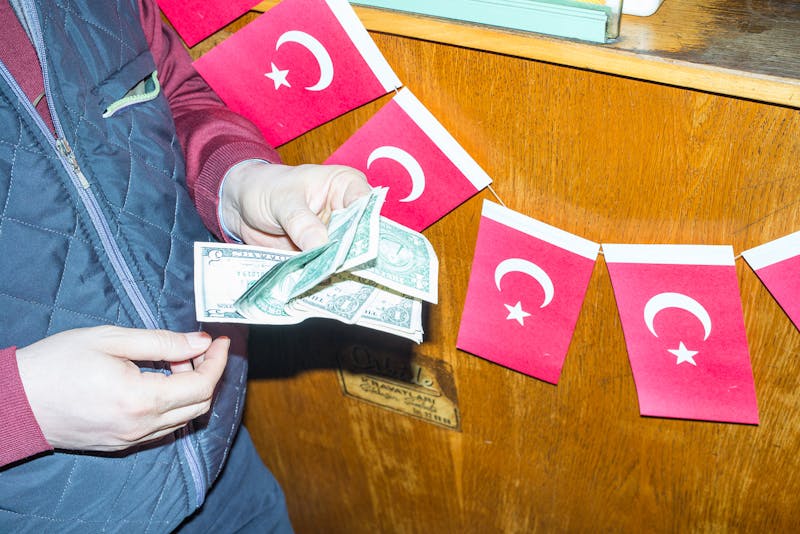
I asked every student whether they grew up hearing from their parents about the 1980 coup, which many Turks believe the Americans may have had a hand in, or the CIA meddled in Turkish politics. I assumed that most of their parents had been leftists and would have talked about such things. I was right; but it didn’t seem as if their parents belabored this tormented history in their households. And yet the long decades of Turkish-American history seemed somehow embedded in their consciousness in ways it was never embedded in mine, and I could sense that that history would somehow inform their feelings about Donald Trump.
“We knew that American interests don’t align with the Turkish ones,” one student, who currently goes to school in the United States, said. “All of us were skeptical of the American stance against Turkey. We all knew there was this huge Marshall Plan, and we knew that it was complicated.” (Some of the earliest foreign aid funding under the Marshall Plan, the U.S. effort to rebuild in Europe and elsewhere after World War II, went to Turkey.)
The Turkish-American relationship more or less began in 1946, when the USS Missouri, an American warship, sailed up the Bosphorus to bring home the dead body of Munir Ertegun, the Turkish ambassador to the United States. It was the beginning of the Cold War, and the Americans wanted to make a dramatic gesture of claiming the country for the West’s side. Turks at the time were enthralled by the idea of America; the United States was victorious in World War II but was not an imperial aggressor on the scale of the British, the French, and the Russians. The United States was unknown and therefore innocent. In the days before the Missouri’s arrival, Turks scrubbed the streets and taxis, spiffed up the brothels, and strung the word WELCOME in lights throughout the city.
Turkey was dominated at the time by Kemal Atatürk’s Republican People’s Party. The RPP was Western-looking but also fiercely nationalist and protective of the domestic economy. In 1950, in Turkey’s first free elections, the RPP was defeated by the Democrat Party, which welcomed American aid. The Marshall Plan and the Truman Doctrine of the late 1940s and 1950s sent Turkey millions of dollars and hordes of “experts” to help modernize its roads, farms, and military. In 1950, Turkish soldiers left for Korea to fight on the American side. Two years later the country joined NATO, and thousands of American soldiers descended on Turkish soil over the next decade. The Marshall Plan and the Truman Doctrine, so often portrayed as America’s most benevolent foreign policy actions, kept Turkey within the American sphere of influence, protection, and—eventually, to some degree—control and exploitation.
By the 1960s, the often crude and bumbling Americans living in Turkish cities began to offend Turks. “You have created slaves and compradors in Turkey,” the novelist Yasar Kemal wrote in an open letter published in a Turkish newspaper. “Your soldiers can bring into the streets tens of thousands of Turks by being disrespectful to Turkish women. Your soldiers constantly tear down and trample Turkish flags. They run over people in the streets and are not even tried in Turkish courts.” In 1964, when President Lyndon B. Johnson warned, in what is known as the “Johnson letter,” that Turks should stay out of a skirmish with Greece on the island of Cyprus, Turks began to wonder what had become of their hard-won independence. Had they defeated the Europeans during their war for independence only to succumb to the Americans?
The war in Vietnam would soon gain international visibility, and the idea of America as an imperialist country took hold of the imagination of the world’s youth. Turkish students—an evolving left that included Marxists, Maoists, Leninists, and socialists—began protesting the presence of the U.S. Sixth Fleet in the Bosphorus and the Mediterranean, as well as the military bases in Izmir, Adana, and elsewhere. By the 1970s, daily episodes of street violence between leftists and rightists were so prevalent that ordinary people feared leaving the house. Two military coups ostensibly meant to stop the killing, one in 1971 and one in 1980, were perceived by some to be supported by the United States. An entire generation went to jail, and many were killed, tortured, or exiled.
The 1980 military coup radically changed Turkey. It went from being an officially secularist and statist country to a more capitalist and even religious one—exactly what the Americans wanted from Muslim countries that they feared might be lost to Soviet communism. It is the 1980 coup for which many Turks will never forgive the United States. Those on the left argue that it brought about a strongman leader like Erdogan, who embodies a particular post-1980 ethos: that a combination of capitalism and soft Islamism would make Turkey a more stable country. For others, it cast a shadow over the very idea of “truth.” Like many foreigners, Turks are prone to thinking the CIA, which may have had a role in the coup, is more expert and powerful than it is, and that the hidden hand of Uncle Sam is always at work. These conspiracy theories are somewhat understandable because what actually happened between the U.S. and Turkey during the Cold War remains murky, and few Americans acknowledge the relationship at all.
Much has changed since those bifurcated Cold War days. Turkey’s economy opened up to the world, and Turks began to move freely across borders, gaining more access to information and products from abroad. The world came to them as much as they sought out the world. Turks may still have dreamed of Europe or America, but Istanbul would eventually become a global, free-feeling city, too. Many of the Robert College graduates I spoke to experienced the best of the Erdogan years, when the benefits of the visibly expanding economy still distracted from the worst of the government’s autocratic excesses. As a result, the event in 2016 that most affected Turkish students’ decisions about going abroad for college or staying home was not the election of Donald Trump but the attempted military coup against Erdogan on July 15, which many Turks also believe was supported by the Americans, and Erdogan’s subsequent purge and jailing of many thousands of people, including academics, government officials, and journalists. Social media was scoured for posts offensive to the president, and the judiciary was rendered servile to him. The future of Turkey began to feel wildly uncertain. In that context, Donald Trump’s presidential victory has a very different meaning for Turks who might want to go to college in the United States. “There is an independent judiciary in America,” one student said. “If you didn’t have that in your own country, which one would you choose?”
More important to the Turks I spoke with is the nature of a government’s systems, its democratic and bureaucratic architecture. They are ultimately less interested in people or personalities than they are in institutions, and nothing they have seen so far convinces them that America’s institutions have been broken. Maybe, they said, if Trump is reelected, they’ll start to worry. But even someone as brilliant and wily as Erdogan—who, unlike Trump, is a bona fide political genius—took 15 years to grab control of the entire Turkish state. “People still believe in the American system,” one student said. “Erdogan changed the Turkish system. Trump is trying and failing to change the system. Erdogan got to define what the Turkish Republic is. Trump doesn’t get to define what the United States of America is.”
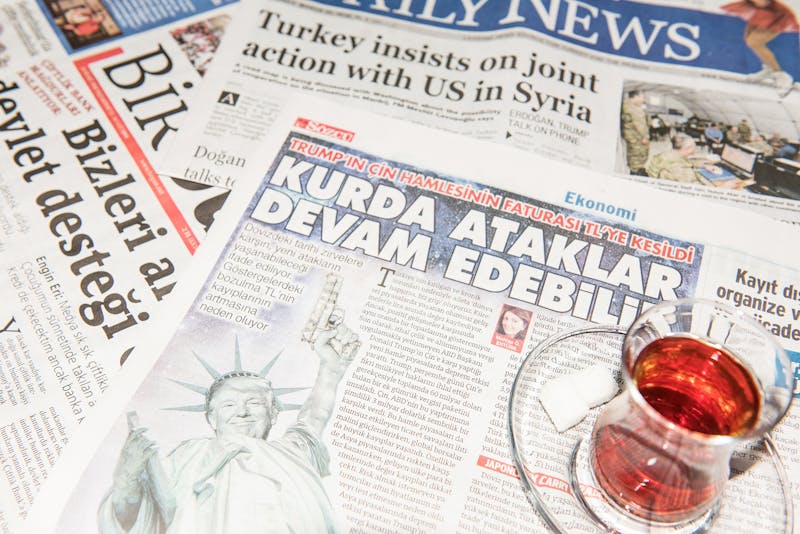
The Erdogan government had high hopes for a Trump presidency. Turkey has been engaged in a war with Kurdish rebels for some years now, and Erdogan perceived Barack Obama to be pro-Kurdish, mainly because his administration supported Kurdish rebels in Syria and Iraq. He hoped a Republican president, or perhaps an inexperienced one, would be more sympathetic to Turkey. He was wrong. Today, the United States is still playing the same double game it always has, aiding the Kurdish rebels and the Turks at the same time. There’s a sense in the country right now, among pro-Erdogan people, that Turkey and America are at war in Afrin, a Syrian region near Aleppo, where the United States is allied with both Turkey and the Kurdish rebels, and where Turkey is bombing those same Kurdish rebels. In local newspapers, Erdogan threatened to give the United States an Osmanli tokadi, or Ottoman slap.
Listening to the Robert College students, I realized that for foreigners, the one thing that hardly changes from U.S. presidential administration to administration is, in fact, its foreign policy. The recent documentary about the Obama administration, The Final Year, a piece of brazen liberal hagiography that was lauded by many critics anguished over Donald Trump, makes it seem as though Trump would upend a world peace that had been lovingly tended by Samantha Power and Ben Rhodes. That view is not shared in Istanbul. “I loved Obama. I loved him like a celebrity,” the woman at Mangerie had said to me. “But look at what Obama did to the Middle East. What difference is Trump for us?”
Perhaps because of this conception of the United States as an inevitably destructive force, a few Robert College graduates were happy about the weakening of America’s global power and prestige. I think the time has come for America to struggle, one said to me, half-apologizing at the same time. His paternalistic tone was not unlike George Washburn’s during the Spanish-American War: This 20-year-old was just as unconvinced, in 2018, that America should be a world leader as Washburn had been in 1901. “America is losing the big stage right now not because of their internal affairs and issues, but because of how they started messing up internationally,” the Turkish student said. “People don’t look up to America anymore. America is this naughty boy. There is nothing about it that is so special that makes it the leader of the world.”
The idea that the United States controls the world is fading, too. “I am watching in amazement this ordeal with Russia,” another student said. “I never imagined that the U.S.—simply because it is the U.S.—would be the one that was hacked. There is a classic Turkish sense that everything must be done by the U.S., and nothing can be done without its consent. Now I am rethinking that. If this could happen in the U.S. then.… Wow.” This reversal in world power might be of some benefit, the student seemed to say, and for that, we may have Trump to thank.
George Washburn had written that Robert College was a “standing protest” against the uglier aspects of American society: the gun violence, the obsession with money, the lack of “respect for God or man.” The values the school was once supposed to represent were “a higher Christian civilization and the blessings of a free government—a government of the people by the people.” But perhaps the problem was not the failures of America but these Christian missionary conceptions of it; the demand that America should somehow be more special than any other civilization. It is a credit to Robert College that it produced Turkish citizens who would be critics of this first and fundamental American mistake: assuming heavenly perfection before it has been earned.
“Americans are doing a lot more self-reflection,” one of the students said. “People are thinking about imperialism and their own identities. That whole end of history, we’re wonderful thing. It’s coming apart.”
